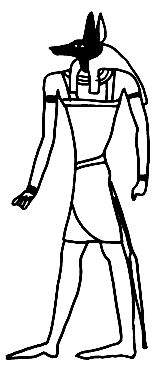
God of embalming, represented as a jackal or dog. Observation of this animal, scavenging around the tombs on the west bank of the Nile for prey, led the Egyptians to entrust him with the care of the dead body, in an example of sympathetic magic, thus warding off that danger. Anubis' job was to take ritual care of the mummy, to destroy the enemies of Osiris during the vigil, and to assist during the Opening of the Mouth ceremony before the funeral. These tasks were actually carried out by priests. Representations in tombs from the New Kingdom indicate that masks depicting the head of Anubis were worn by the priests. One of these masks has actually been found and is now in the Pelizaeus-Museum in Hildesheim. In numerous texts from as early as the Old Kingdom, Anubis is asked to ensure a good burial and many offerings. In addition, according to the Pyramid Texts, the god was responsible for counting the hearts, and together with Thoth he was a member of the tribunal for the judgement of the dead. He is depicted in the same role centuries later in the vignettes of the Book of the Dead. In the Graeco-Roman Period, Anubis, as the escort of the souls, was equated with Hermes. Depending on the tradition, the god was seen as the child of Re or the son of Osiris and Nephthys; other goddesses, including Bastet, were occasionally called his mother too. Anubis is depicted as a black dog or jackal, sometimes lying on a shrine, as in the tomb of Tutankhamun, or as a man with the head of a jackal.